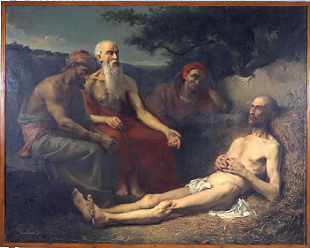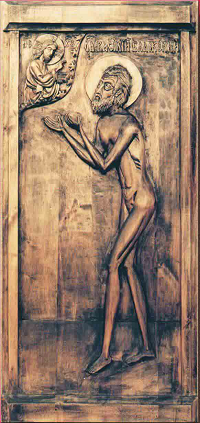Job and Basil
Job lived at Hus in the
Middle East. Where was Hus? When? No one knows,
because Job is perpetual and universal. Job
is a book in the Bible written in rough Hebrew marred with
Aramaic, but a beautiful piece of spiritual inspiraton. It is
the story of a rich man gone destitute and sick with painful
ills, whose sole happiness is hope. The story of the just man
destitute and exposed to suffering in the sinful world,
which we have to change (Rev of Arès 28/7), has
forever been rebounding from earlier antiquity to God's Day.
I dare to give up the standard analysis of the Book of Job
and liken Job to Basil the Blessed, another poor bum,
who lived nude in Russia in the early 16th century, and who is
little known to Western people, and after whom a cathedral is
named in Moscow. I may be opposed by some who see both of them
as dissimilar. They are not dissimilar to me. The world
will be rife with Jobs and Basils until the Day
of God (Rev of Arès 31/8).
____________________________________

Sermonizerss
Eliphaz, Bildad and Zophar,
who take Job to task, and who scold him, are just specimens
among the perpetual sermonizers, whether religious,
or political, or moralistic, etc.
The verses 1/6-2/10 in the Book of Job
mention Satan, whom God was supposed to allow to put Job
to the test, but this is just an addition by man, a book by
man (Rev of Arès 16/12, 35/12). Not only does not God put
man to the test — man always puts himself to the test —, but also
Satan has no existence. Humankind is the cause of their destiny,
their own harm (2/1-5, vii/7-11) therefore.
It is not clear that Job is not a renouncer in times
immemorial, just as Basil the Blessed is a renouncer between 1486
and 1551. Job is a man of heart and humbleness (Job
42/2-6), who I think might well renounce wealth, undergo or
opt for poverty, so he might lay open to bad health.
It is not known whether Job is Hebrew, Arab, Babylonian,
Persian and so on. He is just the man facing all contingencies or
all choices possible of his sinful background, of which
he develops awareness in the Book of Job. He does not
lose faith or piety, and especially — as the pinnacle of the Book
— he finds out that 'justice', which each religion
grants the divinity it venerates, or politics grants its law, is
nothing to do with that which the Word calls Justice
(Rev of Arès 1/5, 22/12, 35/9, etc.), which is only what is
just in the meaning of true.
Whether a wise man turns or does not turn destitute, sick and/or
anxious, it is not the world's problem. The world's problem is sin,
the lack of love, revenge, lying, pride, greed,
etc. Job protests his honesty. Four of his friends,
Eliphaz, Bildad, Zophar and Elihu, try to bring him to their
moralism and conformism, but they are just the presumptuous
irksome people who have been fond of managing the world for
millenia, those whom I can see reappearing in papers, on my
television screen or on the radio every day.

Basil the Blessed
forever nude on icons
In the Bible the Father or Life
adresses Job out of the storm : Who is this that obscures
divine plans with words of ignorance? Where were you
when I founded the earth? (Job 38/1-4). Job,
then, listens to the Life's Voice, maybe in the
same way that I shall listen to It 3,000 years later in Arès —
3,000 years are nothing more than 3.000/92=32 lifetimes as my own
lifetime! —. He does not perceive the Truth in its
complete extent and depth, as well as I do not perceive it in Arès,
because man has forgotten about it for too long, man has learned
not to keep it by heredity and culture, which go together, but he
catches a glimmer of it the True. The True of
The Book in The Revelation of Arès (xxxiv/1-4,
xxviii/21). Job understands that, even
though his friends are quibblers who have reprimanded him
unfairly, he is as unable as them to have any grasp of the
ungraspable Love, Which handles everything, and
confront Sanctity, Power and Light (Rév d'Arès 12/4).
He'd better keep quiet in front of Life, he only
behaves as a confident humble man.
The just man's sufferings are to remain mysterious and
unconscionable as long as sinners miss the obvious,
namely that man goes on rejecting the Maker's Design,
although they still are capable, even poorly and by cringing under
the Light, of reviving Divine roots deep inside
themselves and regaining something of the Father's image and
likeness (Genesis 1/26-27) at the cost of penitence
or love, which they still can exercise on a human scale.
Today human beings, about 3,000 years or more after Job
and his sermonizing friends were extinct, still cannot understand
that the good or the evil of one human falls upon all of
men, including the newborns and innocent, at random, because there
is among human beings, however numerous and native they may be, an
existentital kinship. Actually, there is just one man by the
billion, just as there is one Life (Rev of Arès 24/3-5)
in trillion trillion atoms. That string of good beads
and evil beads, that follow each other, has lasted ever
since Adam's days (Rev of Arès 2/1-5) and
stretches on the total length of time (12/6).
The covidian flu has disposed of Job in Bordeaux, France,
mysteriously. This colorlessly bodes ill for a long hard
apostolate. Job is the key figure that shows his
refusal of the current world, he is missed by hope, at least by my
own hope. On Gambetta square, we miss the grimy ageless lady bum,
who used to sit between her two bundles on the plinth of the
Hermès boutique — a stark contrast between the cage of luxury and
the female bird's freedom —. She used to shout abuse at the
passers-by, "You twit, enfoiré, slut, and so on!" and then, as she
saw us Christiane and me come near, a smile lit up her face
with joy as if by magic and she told us hello with sophisticated
exquisite politeness... And we felt uncomfortable being too well
clothed. We miss the old man skin and bone who used to sit on the
curbstone of a bank, on Albret walk, another ageless bum who
coughed up his lungs (youth sanatorium memories: I remembered the
hollow echo of the phthisics who used to clear their ribcages
minute piece by minute piece). We talked with him; he had the
rasping great kindness of an old little child. As long as the
world fails to change, there will be Jobs
reminding us of becoming different. And when the world changes,
the Day will break when the Jobs, who as
beautiful sailships are cruising on the Sea of stars on
high, come back down from the Saint's Heights (Rev
of Arès 31/11) along with Life (24/3-5).

Xxxxx xxxx xxx xxx
Signature
Reply :
Xxxx xxx xxx xxx
00xxx00 xxxC2
Xxxx xx xxxx xxx xx x xxxxxxxx xxx xxxxx xx xxx .
Signature.
Reply :
Xxxx xx xxxx xxx xx x xxxxxxxx xxx xxxxx xx xx.